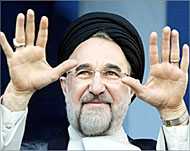Iran flaunts missile might
Iran has paraded six of its newly deployed medium-range missiles which could reach Israel or US bases in the Gulf, despite pressure to dispel fears it is developing nuclear arms.

Monday’s defiant parade included the largest number of Shahab-3 ballistic missiles put on public display since Iran announced in July it had finished testing the weapon and deployed it with the Revolutionary Guards.
The sand-coloured Shahab-3 missiles, towed along to the accompaniment of rousing military music, were the climax of a lengthy parade to commemorate the start of the 1980-88 Iran-Iraq war.
Iran’s President Muhammad Khatami said the show of strength should not be read as sabre-rattling.
“The Islamic Republic of Iran’s policy is based on detente,” he said at the parade led by disabled war veterans.
“We are opposed to the proliferation of weapons of mass destruction and nuclear weapons but we insist on our absolute right to be powerful in the scientific and technological arena.
“The Iranian people, who are pacifists and have a love of justice, have always said their military strategy was defensive and that they do not want weapons of mass destruction. Yet it is they who are subject to international pressure by those who support Israel – the centre of terrorism and weapons of mass destruction,” the president added.
Clear threat
Uzi Rubin, former director of Israel’s Arrow anti-ballistic missile system programme, said Iran’s Shahab-3 was a clear threat to the Jewish state.
|
“We will stamp on America” Banner message on one of the missile carriers |
“The (Shahab’s) increased range covers the whole of Israel, north to south, from deployment areas deep within Iran, and thus increases concern as to what would happen if such missiles were armed with WMD warheads,” he told Reuters.
Television pictures showed one of the missile carriers displayed a defiant message in bold letters on a giant yellow banner facing Khatami. “We will stamp on America,” it read.
Based on the North Korean Nodong-1 and modified with Russian technology, the Shahab-3 is thought to have a range of 1300 km.
Iran says it is intended to serve purely as a deterrent and has not declared how many Shahab-3 it has been able to manufacture. Military analysts say questions remain about its reliability and accuracy.
Concessions to UN pressure
The UN’s nuclear watchdog, the International Atomic Energy Agency (IAEA), declined to comment on the missiles, as it prepared to send legal experts to Iran, which faces a deadline of 31 October to prove it is not secretly making nuclear weapons.
Ali Akbar Salehi, Iran’s representative to the International Atomic Energy Agency (IAEA), hinted Iran would have to sign an additional protocol to the nuclear Non-Proliferation Treaty (NPT) despite its objections.
 |
|
President Muhammad Khatami has asserted his country’s right to bear arms, if not nukes |
“In the near future, IAEA legal experts will travel to Iran” to continue discussions on the additional protocol, Salehi said in an interview on Iranian state television.
“So far, on the direct orders of President Khatami and to show good faith and transparency, we have cooperated beyond the accords and allowed samples (to be taken from) and inspections of non-nuclear sites,” he said.
‘Bitter reality’
Salehi said that in future Iran would go no further than its commitments, “while completing what has been embarked upon.”
“The international protocol is not a good protocol and amounts to interference in the affairs of states,” he said.
“But, in any case, the countries which have signed the NPT must sooner or later sign up because they (the IAEA and major powers) have planned things that way,” he said.
“It’s a bitter reality,” he concluded.
An IAEA resolution, passed on 12 September after strong US lobbying, demands Iran answer all the agency’s questions on its uranium enrichment activities, grant unrestricted access to UN inspectors and a detailed list of its nuclear-related imports.
Iran fiercely denies it is seeking to acquire nuclear weapons, but its failure to comply could lead to Tehran being declared in non-compliance with the NPT, with the matter being passed to the UN Security Council.